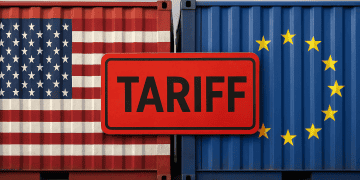The European Union has approved a new set of retaliatory tariffs on specific U.S. products, with implementation expected to begin next week. All EU member states, except Hungary, voted in favor of the measures on Wednesday.
The decision follows a series of tariffs imposed by the U.S. under the Trump administration, including a 25% tariff on European steel and aluminum. The EU’s new tariffs are seen as a response to these U.S. actions, although the bloc is still considering its response to separate U.S. tariffs on European car imports.
Earlier in the day, U.S. President Trump announced via social media that he would pause tariff increases for most countries for 90 days, but would implement a 125% tariff hike on China.
The EU’s new tariffs, which are expected to target U.S. motorcycles, poultry, fruit, and wood, are scheduled to take effect gradually, with the first round starting Tuesday. Further rounds are planned for May, with the final round expected to take effect in December. A spokesperson for the European Commission stated that details of the tariffs would be released next week.
The European Commission has stated that the tariffs are intended to address what it calls “unjustified and damaging” U.S. measures. However, the EU also indicated that these countermeasures could be suspended if the U.S. agrees to a “fair and balanced negotiated outcome.”
Despite the escalation, the European Union has expressed a preference for negotiating a mutually beneficial trade agreement with the U.S. French Trade Minister Laurent Saint-Martin reiterated this stance, emphasizing that a tariff war is harmful for both sides.
The announcement of the new tariffs coincided with a drop in European stock markets. Major indices in London, Frankfurt, and Paris fell by approximately 3% on Wednesday, marking a continued decline since the announcement of global tariff measures by President Trump.
Discover the latest in supply chain logistics news on The Supply Chain Report. Free international trade tools are available at ADAMftd.com.
#EUTariffs #TradeRetaliation #USExportImpact #TransatlanticTrade #TradeDisputes #GlobalTradePolicy #EUUSRelations

















